coaching
How I Presented at STPCon without Being Present
28.03.12 - 07:05 - Filed in: Software Testing
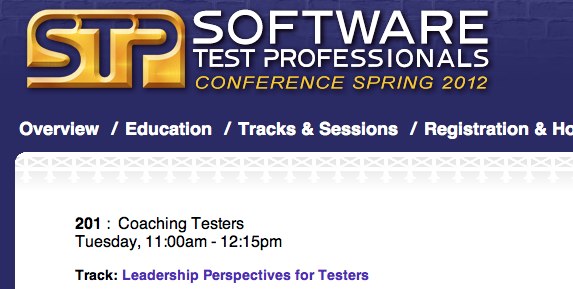
Have you ever presented at a conference without you actually being there? I did. It was fun. Of course I could not even see the audience as I was not there. I did not hear a word from them.
By now you might ask yourself: “Has he lost his mind?”
That could be a valid explanation but it is not correct.
The conference I am talking about is Software Test Professionals Spring 2012 (STPCon) in New Orleans. I did the second part of Anne-Marie Charrett’s track on coaching testers. It was a live Skype coaching session I did with Vernon Richards who was my student. The audience saw our transcript unfolding while Anne-Marie identified patterns and commented on what we did.
See? I am not crazy.
We only had half an hour which is unusually short. So, we had to skip many elements of a typical Skype coaching session. But Vernon did great under the time constraints.
The exercise we did was an observation and description task. I won’t say too much about it because I do not want to spoil the experience for students who want to do it.
Anyway, it was kind of unusual to know that there is an audience watching us while we unfold our session. I hope there is a video recording. Will have to talk to Anne-Marie.
So, dear audience at STPCon, I hope you liked what you saw.
BTW: For free Skype coaching go here
James Bach and how I Enjoyed his Visit to Switzerland
22.03.12 - 20:36 - Filed in: Software Testing
Some weeks are boring, some weeks are frustrating, some weeks are just regular. But once in a while there is a week filled with exitement, learning opportunities, joy and intellectual challenges. I am a lucky guy because I happen to have lived such a pleasurable week recently. James Bach came to Switzerland for the first time.
His flight was coming in from England where he attended several appointments in Cambridge. I was waiting for him to exit into the arrival hall. As expected it took not long for James to drop a puzzle bomb on me. It goes as follows:
Question: What is the sum of x + y, what is the product of x * y and what are the values of x and y
A hint: It is possible to solve it by the sole use of your brain, a sheet of paper and a pencil
IMPORTANT: Please do not leave the solution in the comments below
While driving James to his hotel I tried if there was a simple solution to the puzzle but I could not find one so I decided to attempt to solve it as soon as I got home. Also, it is not such a good idea to try to solve puzzles while driving.
In the hotel we had some more testing discussions before James retired to his room and I was very eager to get back home to solve his puzzle. I think I was on a good path towards the solution but I decided to give me a break because I was stuck somehow.
Interesting enough, the brain seems to have its playful free time during sleep. My brain decided to wake me up at about four a clock in the morning giving me a hint about how to solve it. I decided to get some more sleep and just took some notes on the general idea. Later in the morning I solved the puzzle which made me kind of proud. Tricky one, this one!
Sunday afternoon I picked up James from his hotel and we strolled through Zurich while he entertained me with a lateral thinking puzzle involving a waste dump. Again I enjoyed it very much and it gave me the appetite for the dinner. James is very good at challenging your thinking.
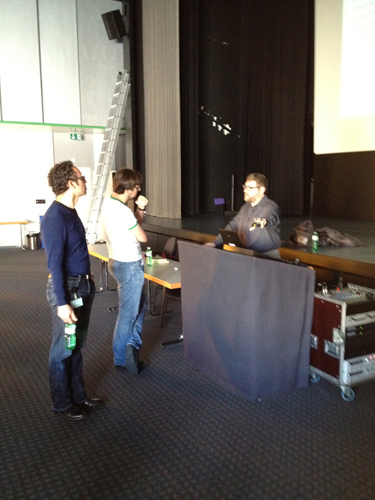
Monday morning we took the train to my workplace Phonak AG, where James spoke all day about tester self-education and did many puzzles with the audience of about 50 people. The astonishing thing was that there were more developers present than testers. What a great success for software testing. Developers become more and more interested in what we do. We testers have won! (Just joking, I love you all, dear developers)
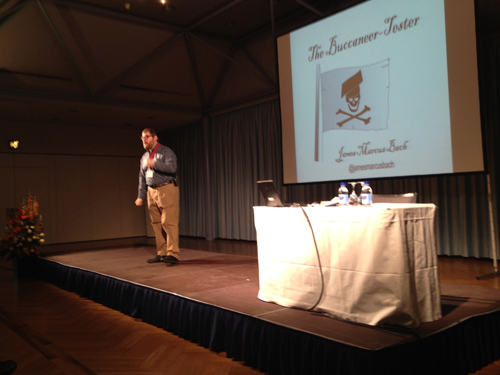
This year’s Swiss Testing Day saw an amazing record breaking number of 800 participants. James had the first of the keynotes in the morning (you may see the video here) and I hope he inspired many testers to become interested in the context-driven school and self-education. I expect to see more Swiss testers working on their reputation in the future.
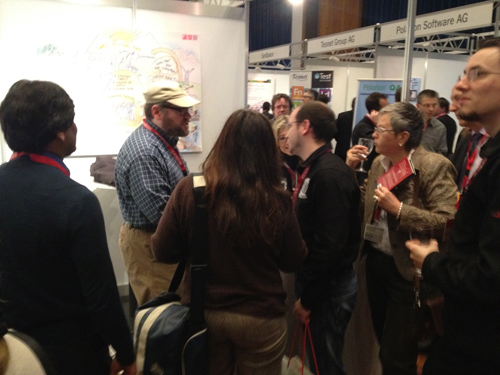
We sold James’ excellent book Secrets of a Buccaneer-Scholar at our conference booth and every 10th person at the conference bought a copy. That, too, gives me hope that there are more context-driven people in Switzerland. If you - dear reader - are one of them, please contact me immediately. I want to get to know you and talk to you. James talked all day to many people, there were dice games and his hand must have been tired from all the book signing.
Thursday was a work day, we went through some of my Skype coaching transcripts and James gave me a lot of valuable feedback. We did that in one of my favorite coffee shop/book store Sphères in Zurich. It is the perfect place for productive work.
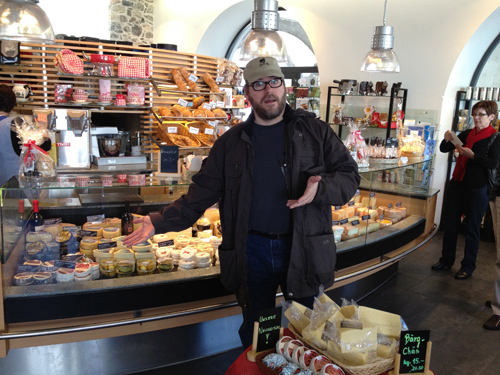
Friday came and James was very eager to learn about Swiss cheese. We drove to Engelberg where there is a public display of cheese making located in a monastery. In the middle of a room there was a kind of glass igloo where a cheese maker was doing his stunts while the visitors pressed their noses flat on the outside. A bit like in a zoo, but without animals.

In Engelberg we found the wonderfully victorian Hotel Terrace from where we had a beautiful scenery of mountains. Again we went through more coaching transcripts and tried to identify patterns.

After coming back to Zurich, we ended our day with a dinner at the Prime Tower on the 35th floor and challenged each other with some more lateral and mathematical puzzles. James also made fun of me because I was eating my hamburger with fork and knife. See, that’s us Swiss people behaving at a fancy restaurant. Anyway, great day, but then we were both tired at the end. It was like in Monty Python’s “Just a thin mint”-scene (Caution: this link is not suitable for the faint-hearted), one more puzzle and my brain might have exploded.
James headed off to Stockholm on Saturday, I said good bye at the airport and I hope he comes back to Switzerland soon. You’re always welcome, my friend.
BTW: Here is the link to James’ view on his visit to Switzerland.
His flight was coming in from England where he attended several appointments in Cambridge. I was waiting for him to exit into the arrival hall. As expected it took not long for James to drop a puzzle bomb on me. It goes as follows:
- You have a range of integers from 2-180
- Two integers x and y are chosen from the range (x and y may be equal or different)
- A person A is given the sum of x + y
- A person B is given the product of x * y
- First, person B says to person A: “I don’t know your sum”
- Then, person A says to person B: “I already knew that you do not know my sum”
- To which person B replies: “Now I know your sum”
- And then person A says: “And now I know your product”
Question: What is the sum of x + y, what is the product of x * y and what are the values of x and y
A hint: It is possible to solve it by the sole use of your brain, a sheet of paper and a pencil
IMPORTANT: Please do not leave the solution in the comments below
While driving James to his hotel I tried if there was a simple solution to the puzzle but I could not find one so I decided to attempt to solve it as soon as I got home. Also, it is not such a good idea to try to solve puzzles while driving.
In the hotel we had some more testing discussions before James retired to his room and I was very eager to get back home to solve his puzzle. I think I was on a good path towards the solution but I decided to give me a break because I was stuck somehow.
Interesting enough, the brain seems to have its playful free time during sleep. My brain decided to wake me up at about four a clock in the morning giving me a hint about how to solve it. I decided to get some more sleep and just took some notes on the general idea. Later in the morning I solved the puzzle which made me kind of proud. Tricky one, this one!
Sunday afternoon I picked up James from his hotel and we strolled through Zurich while he entertained me with a lateral thinking puzzle involving a waste dump. Again I enjoyed it very much and it gave me the appetite for the dinner. James is very good at challenging your thinking.

Monday morning we took the train to my workplace Phonak AG, where James spoke all day about tester self-education and did many puzzles with the audience of about 50 people. The astonishing thing was that there were more developers present than testers. What a great success for software testing. Developers become more and more interested in what we do. We testers have won! (Just joking, I love you all, dear developers)

This year’s Swiss Testing Day saw an amazing record breaking number of 800 participants. James had the first of the keynotes in the morning (you may see the video here) and I hope he inspired many testers to become interested in the context-driven school and self-education. I expect to see more Swiss testers working on their reputation in the future.

We sold James’ excellent book Secrets of a Buccaneer-Scholar at our conference booth and every 10th person at the conference bought a copy. That, too, gives me hope that there are more context-driven people in Switzerland. If you - dear reader - are one of them, please contact me immediately. I want to get to know you and talk to you. James talked all day to many people, there were dice games and his hand must have been tired from all the book signing.
Thursday was a work day, we went through some of my Skype coaching transcripts and James gave me a lot of valuable feedback. We did that in one of my favorite coffee shop/book store Sphères in Zurich. It is the perfect place for productive work.

Friday came and James was very eager to learn about Swiss cheese. We drove to Engelberg where there is a public display of cheese making located in a monastery. In the middle of a room there was a kind of glass igloo where a cheese maker was doing his stunts while the visitors pressed their noses flat on the outside. A bit like in a zoo, but without animals.

In Engelberg we found the wonderfully victorian Hotel Terrace from where we had a beautiful scenery of mountains. Again we went through more coaching transcripts and tried to identify patterns.

After coming back to Zurich, we ended our day with a dinner at the Prime Tower on the 35th floor and challenged each other with some more lateral and mathematical puzzles. James also made fun of me because I was eating my hamburger with fork and knife. See, that’s us Swiss people behaving at a fancy restaurant. Anyway, great day, but then we were both tired at the end. It was like in Monty Python’s “Just a thin mint”-scene (Caution: this link is not suitable for the faint-hearted), one more puzzle and my brain might have exploded.
James headed off to Stockholm on Saturday, I said good bye at the airport and I hope he comes back to Switzerland soon. You’re always welcome, my friend.
BTW: Here is the link to James’ view on his visit to Switzerland.
Bob Likes to Be Coached, Alice Likes to Be Teached, Both Like Study Groups
19.02.12 - 16:35 - Filed in: Software Testing

In a book - I cannot remember which one - I read that if you print a math formula you will immediately lose 90% of your audience. I am free from worry here, because you - dear readers - are all nerds and number maniacs. So, I know you stay with me. And the ones who are about to leave soon, I’d like to offer some compassionate farewell words:
“Bye, Bye, and may you always remain unbothered and safe from formulas wherever you go .”
Ok, my dear socially awkwards, here we go. Something you often encounter in your tester life is the following:
k(a) > k(b)
whereby:
k = testing knowledge
a = e.g. Alice
b = e.g. Bob
let’s further define that “knowledge k” may consist but is not restricted to the following:
- number of books/articles about software testing or other useful topics read, understood and successfully applied in practice
- knowledge gained through collaboration with experienced masters
- empirically gained knowledge
let’s also further define that:
- Alice (a) and Bob (b) are human beings
- and more specifically testing human beings.
or to put it in simple words that wouldn’t have shied away 90% of the readers:
Alice knows more about software testing than Bob
So, both Alice and Bob work in your team. If your goal is to advance the knowledge of your people what would you do? And now comes the crucial question:
Who should teach whom?
Alice should teach Bob, of course, you might say. Now, let me tell you my dear friend that the gun shot answer to that question is wrong. Again, as you should know from your testing experience the obvious solution is at best incomplete. Same here. Of course Alice knows more about testing and can teach Bob quite a lot. But maybe Bob is a natural born coach and can therefore coach Alice. A coach is not somebody who knows more but somebody who can elicit self-learning in people.
Furthermore, they could together form a study group where the dynamics of the group helps them both to advance. And certainly advance more than if they had studied alone.
There are also some dysfunctional learning devices, such as:
- criticism: “I don’t like that you don’t know it better”
- demanding: “I want you to know that! Now!”
- ex-cathedra lecturing: “Test Plan, bla, bla, bla, bla, important, bla, bla, bla,….”
Let’s wrap up:
If your team wants to become really good at software testing it helps to constantly keep on learning. There are many possible paths to advance the groups knowledge. Choose the right paths. And: Just because you don’t like something (e.g. a formula) you shouldn’t give up right away. Be open for new experiences. There is no place for narrow-mindedness in software testing.
Free Coaching via Skype
03.02.12 - 14:09 - Filed in: Software Testing
CURRENTLY ON HOLD - NO COACHING SESSIONS AT THE MOMENT
During the past few months I had Skype coaching sessions with James Bach on a regular basis. Recently, we started to reverse our roles (I was the coach and he was the tester asking for coaching). I have gained a bit of experience in coaching testers. Now, I would like to sharpen my saw and that is why I have this offer for you:

How does it work?
Here is some feedback from participants:
Thanks a lot Ilari Henrik for the session and pointers to communication model.
If that is the case then I would like to give feedback on the session.
1. Very interactive
2. showed patience
3. Very well received because I was little nervous
4. built good repo
5. Helpful
6. Encouraging
Looking forward to make a difference...
Thanks,
Savita
http://savitamunde.wordpress.com
During the past few months I had Skype coaching sessions with James Bach on a regular basis. Recently, we started to reverse our roles (I was the coach and he was the tester asking for coaching). I have gained a bit of experience in coaching testers. Now, I would like to sharpen my saw and that is why I have this offer for you:

How does it work?
- You contact me and we try to find a date and time (my Skype-ID: ilarihenrik)
- We use the messaging system of Skype
- We’ll work on what you are interested in. If there is nothing specific I will come up with something on my own
- I will do this by the use of the socratic method. That means I will try to keep your brain busy by asking demanding questions
- This offer is without obligation for neither part
- As already mentioned: it only costs your time; not your money
- You allow me to use the coaching transcript for my purposes
Here is some feedback from participants:
Thanks a lot Ilari Henrik for the session and pointers to communication model.
If that is the case then I would like to give feedback on the session.
1. Very interactive
2. showed patience
3. Very well received because I was little nervous
4. built good repo
5. Helpful
6. Encouraging
Looking forward to make a difference...
Thanks,
Savita
http://savitamunde.wordpress.com